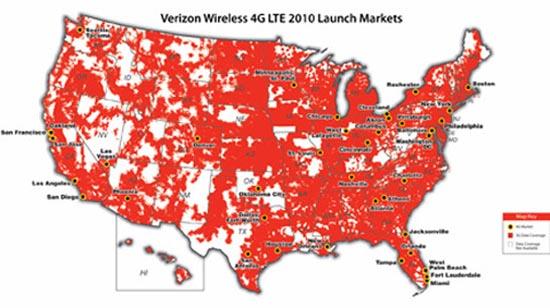
We're all used to paying for data in chunks, like 150MB, 200MB, 2GB, or 5GB, but what if you could start paying more to access faster speeds, too? That's the idea that Verizon is toying with, according to CEO Ivan Seidenberg. In a recent interview, Mr. Seidenberg said that with the move to LTE, Verizon could begin charging data users more for access to faster speeds, similar to how home Internet services are sold, although nothing is concrete right now. With these new plans, users could choose to access faster download speeds or opt for slower speeds and pay less. The possible move to speed-based pricing worries some users that unlimited data plans could be eliminated, but Seidenberg didn't say that the unlimited plans would get the axe. As for T-Mobile and their "4G" network? Seidenberg didn't have any criticisms for Magenta, unlike Sprint and AT&T, saying instead that there are "too many players in the industry" and that it would be better if the companies joined forces.
When it comes to hardware, Verizon has recently said that they would showcase half a dozen LTE smartphones and tablets at CES in January. When will those devices actually launch, though? Seidenberg said that he expects the first LTE handset to make its way to market in February. Of course, no interview with a Verizon exec would be complete without mention of the iPhone, and this one is no different. Verizon's adoption of LTE has drawn interest from Apple, and even helped the carrier get the iPad, says Seidenberg. But the iPhone? Seidenberg wouldn't confirm or deny that Apple's handset would be coming to Big Red, saying that if it does, it's because of Apple. "Our interests are beginning to come together more but they have to take steps to align their technology with ours," he said.
News of tiered LTE data is nothing new, but the idea of charging users more for faster speeds is somewhat of a new idea in the wireless industry. It's definitely an interesting concept, though we'll have to wait and see if Verizon actually goes through with it. The move wouldn't surprise me, especially as more and more users are buying smartphones (Seidenberg expects the number of data users to jump from 23 percent now to 75 percent in the next few years). If someone wants faster data on the LTE network, they can pay a little extra, just like when it comes to broadband at home. Then again, burning through an allotted amount of data isn't something you really have to worry about with your home connection unless you use crazy amounts of data. What say you, readers? Would you pay more for access to faster data speeds?